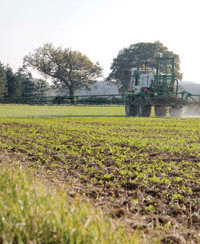Set-aside decision expected at Royal Show

The government has moved a step closer to abandoning controversial plans that would take up to 5% of English arable land out of production.
DEFRA secretary Hilary Benn is expected to announce a decision on a set-aside replacement at next month’s Royal Show, which runs from 7-10 July.
Having survived this month’s Cabinet reshuffle, he is continuing to consider two options in a bid to reverse a dramatic decline in farmland bird populations.
Mr Benn is keen to retain the environmental benefits of set-aside which he believes could help bird numbers recover from a 40-year low.
A compulsory set-aside replacement would see English growers forced to place a proportion of eligible farmland under environmental management.
The compulsory option is favoured by a number of wildlife groups.
But it would be expensive for civil servants to administer at a time when government departments are under pressure from the Treasury to cut costs.
Farm leaders, who oppose the compulsory option, have tabled a voluntary alternative they claim will be cheaper but just as effective.
Known as the Campaign for the Farmed Environment, the voluntary option would encourage farmers to sign up to the Entry Level Stewardship Scheme.
Farmers joining the initiative or renewing scheme agreements would be encouraged to choose management options known to benefit farmland birds.
The voluntary approach is backed by conservation groups, including Linking Environment and Farming (LEAF) and the Farming and Wildlife Advisory Group.
But the RSPB claims it would deliver too little, too late.
NFU president Peter Kendall said he expected Mr Benn to make his final decision known during next month’s Royal Show at Stoneleigh.
“The campaign for the farmed environment is very much an industry initiative. We are adamant that we can change behaviour among farmers.”
Government adviser Sir Don Curry has also spoken of his belief that voluntary measures offer the best chance of a recovery in farmland bird numbers.
“If you can get the majority of farmers enthusiastically engaged, you are going to get a better outcome than if farmers are compelled by regulation.”
